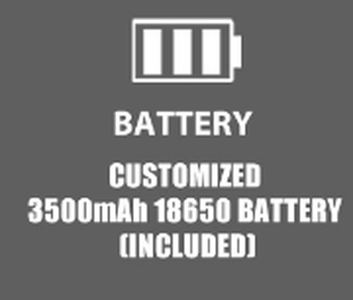That have lots of different flashlights! The one I have uses a triple A battery.
SteveG
@inka As @codecage said you have linked to a page with lots of items (and very few flashlights).
Which one are you trying to source? Do you have a picture of the battery that you are trying to replace, or at least some numbers on the battery casing so that we can help identify it for you?
In other words, we need some more information before we can help you!
😎
Bill
"Never trust a computer you can’t throw out a window." — Steve Wozniak
@dronebot-workshop
https://www.olightstore.com.au/olight-warrior-mini-2-collection-pack
What I want to ask about is WARRIOR mini 2 flashlight. Their description says that it is a customized battery, but I don't quite understand it.
From the looks of it, they have likely embedded a standard battery into some sort of propriety enclosure.
Unfortunately, the only way to tell would be to attempt to disassemble it, but if you do you would need to be VERY careful, don't use any sharp tools to pry it apart. I would strongly advise against trying to pull it apart!
But if you just want to know WHAT it is, it's a battery encased in a shell that they are probably the only vendor of. Nothing wrong with that, but it does limit you when you need a new one.
There are thousands of flashlights with standard 18650 batteries, I would just pick one of them if you want to be sure you can always get a replacement battery.
😎
Bill
"Never trust a computer you can’t throw out a window." — Steve Wozniak
Hi @inka,
I think Bill's comments, as always have a high common sense content.
As to your specific question.
Further down the page you reference, I noticed:
The word 'customised' unfortunately opens a caseful of cans of worms, compared with a 'generic' light that probably hopes to be compatible with the majority of cheap end Chinese cells.
It says it is '18650' ... but that all that tells you is the height (65 mm) and cylindrical diameter (18mm) .. and even then some cells seem to have been measured with very badly calibrated rulers!
The degree of 'customisation' that may live in a can that size is almost infinite, although the majority of 'off-the-shelf' mainstream production is inevitably more restricted.
The chemistry of the battery is probably lithium based, of which there are variants, e.g
- Lithium iron phosphate (LFP)
- Lithium nickel manganese cobalt oxide (NMC)
- Lithium cobalt oxide (LCO)
- Lithium manganese oxide (LMO)
- Lithium nickel cobalt aluminum oxide (NCA)
- Lithium titanate (LTO)
Each of these variants have their own properties (voltage, current, etc.). Load appliances (eg flashlight) and chargers, should be appropriately designed or configured for optimal, and sometimes safe usage.
The cell may have two flat ends (popular with Vape crowd I read ... I definitely have no experience to verify), or one flat, one raised, to look like an outsize AA battery (which is popular with the generic headlights I have come across.
The cell may optionally have an electronic circuit in series with one of the terminals, usually to limit the short circuit current, but a customised one may include other functionality?
So, what are you expecting to do? Buy a set of cheap spare cells as backups? Assuming the flashlight unscrews in the 'traditional way', then they might physically fit, but whether they will function to the same standard is anybody's guess.
And how they will react when connected to your charger is another question. They might be fine, but there is a possibility of catching fire and exploding. And lithium-ion battery fires are VERY TOXIC and extremely difficult to deal with!! Whilst charging is usually the most hazardous operation, they can catch fire for a number of reasons including an internal fault developing or due to overheating in discharge use.
Take care and best wishes.

